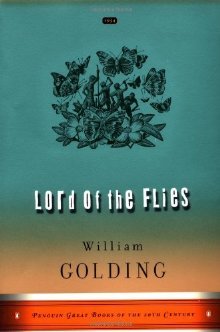Lord of the Flies--William Golding
Originally published in 1954
182 pages--Goodreads
William Golding's classic tale about a group of English schoolboys who are plane-wrecked on a deserted island is just as chilling and relevant today as when it was first published in 1954.
At first, the stranded boys cooperate, attempting to gather food, make shelters, and maintain signal fires. Overseeing their efforts are Ralph, "the boy with fair hair," and Piggy, Ralph's chubby, wisdom-dispensing sidekick whose thick spectacles come in handy for lighting fires. Although Ralph tries to impose order and delegate responsibility, there are many in their number who would rather swim, play, or hunt the island's wild pig population. Soon Ralph's rules are being ignored or challenged outright. His fiercest antagonist is Jack, the redheaded leader of the pig hunters, who manages to lure away many of the boys to join his band of painted savages. The situation deteriorates as the trappings of civilization continue to fall away, until Ralph discovers that instead of being hunters, he and Piggy have become the hunted: "He forgot his words, his hunger and thirst, and became fear; hopeless fear on flying feet." Golding's gripping novel explores the boundary between human reason and animal instinct, all on the brutal playing field of adolescent competition.
I'm not entirely sure how I missed reading this book in high school since it is so often on the required text list. Because it is a widely read book and it was published over 50 years ago, I will include spoilers. If that bothers you, beware.
Golding takes the Robinson Crusoe shipwrecked adventure story and turns it from a triumph to the human spirit to the decay of man's violent nature. Disturbing? Yes. It's about the descent into savagery; I don't think that could be properly conveyed without some element of the disturbing.
The slow breakdown of Golding's mini-society is excellently crafted. It is incredibly creepy because it is so believable. It's not just that the boys kill Simon in their primal dance, but that I can actually see this happening with a group of boys left all on their own. I can see things getting out of hand and going irrevocably too far. The book is a mirror to society, reflecting tendencies we see in people around us and in ourselves.
Golding meant for this to be an allegorical novel to analyze the breakdown from order to savagery. He is not subtle, but his portrayals rarely feels overhanded. Even though the characters have very specific and narrow roles (the intellectual, the savage, the leader, the prophet, the masses), they still have depth. They don't really have breadth, but within their roles they are deeply developed. I also liked the depiction of the ever present threat of the Beast--the fear of the unknown, the compelling drive to violence, the savagery in all of us, the label attached to the scapegoat to escape the fear of ourselves.
I really liked the ending sentence, where the officer turns away from the warlike boy savages to stare at his cruiser, the tool of the adult war that underscores the whole story. It's a reminder that the book doesn't just deal with the possible in society, but with problems we already have.
There is a strong connection to Lost. The Island brings out the best and the worst in people. The rule of law breaks down. There is a "prophet" in tune with the Island. And there are enough Beasts, smoke monsters, and Others to keep everyone on the edge. The Maze Runner spends less time on the collapse society but is another depiction of the cruelty people are capable of when they are desperate.
I didn't enjoy Lord of the Flies as much as I would have liked to. It made me think, but not as deeply as other books have. I wish I'd had the opportunity to study this in a class, because I would have taken more time and thought with it if I had read a physical copy instead of the audiobook. I'm glad I read it, but I won't feel the need to reread it for a while. This book has made it on to a lot of the "Best Books of the Century" lists, and I think it deserves its place. It is a rich text that provides a lot of food for discussion, both about Golding's literary craft and his commentary on society.

No comments:
Post a Comment